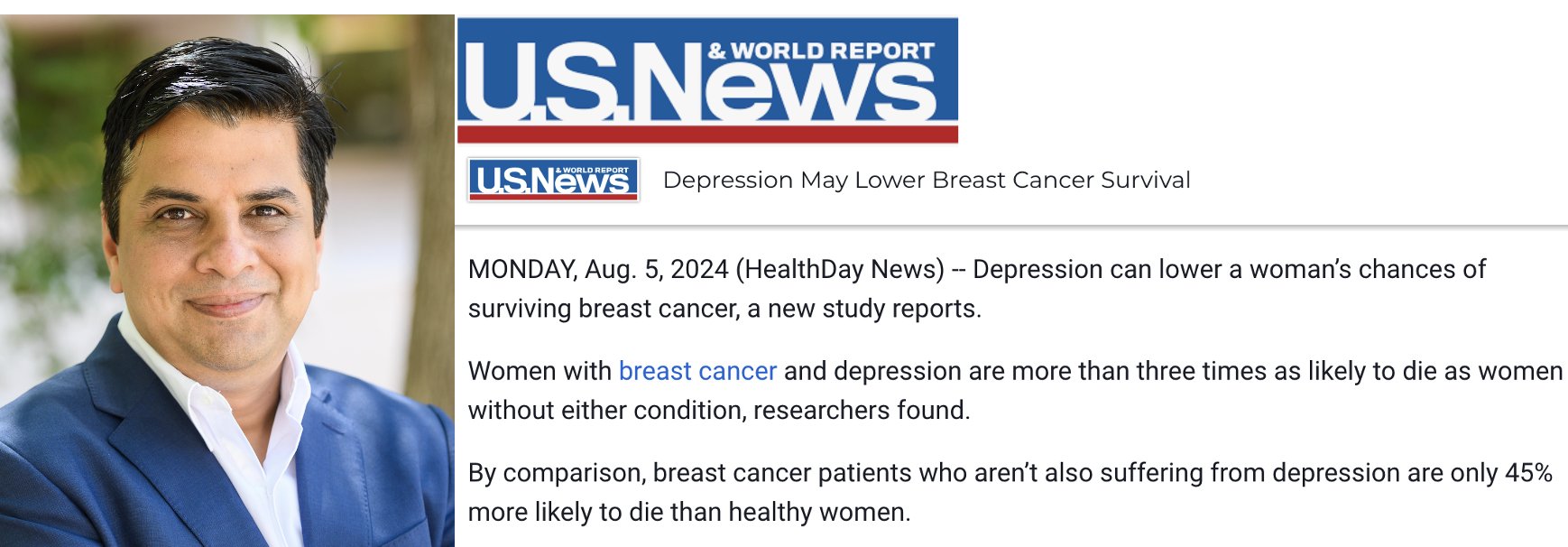NMSU professor in the news.
A study led by Jagdish Khubchandani, NMSU public health professor, is featured in U.S. News and World Report this week. The study finds depression can lower a woman’s chances of surviving breast cancer.
“The combination is what makes the risk of death increase tremendously and leads to thousands of years of life lost,” Khubchandani said. Researchers analyzed data on more than 4,700 women aged 45 and older, about 5% of whom had breast cancer while nearly 13% had depression. They were followed for about eight years. Read more: https://www.usnews.com/news/health-news/articles/2024-08-05/depression-may-lower-breast-cancer-survival?fbclid=IwY2xjawEfnNhleHRuA2FlbQIxMAABHTFreDBzAAKqeGzq3zwpfUrP2W37SmG0azwaUyY6gnIHytRL57SgbbPVsA_aem_Q__FFYbr-m6bjjkswZPQTw
Original Post on Las Cruces Digest (August 6, 2024):

Jagdish Khubchandani, a professor of public health sciences at NMSU, led a study to understand the long-term impacts of depression among American women with breast cancer. (NMSU photo by Josh Bachman)
Source: NMSU News Release
DATE: July 26, 2024
WRITER: Carlos Andres López, 575-646-1955, carlopez@nmsu.edu
New research from New Mexico State University shows depression can reduce survival rates among American women diagnosed with breast cancer.
Jagdish Khubchandani, a professor of public health sciences at NMSU, led a study to understand the long-term impacts of depression among American women with breast cancer. Khubchandani’s study partners included the Kirk Kerkorian School of Medicine at the University of Nevada, Las Vegas, Walden University, and the National Institute on Aging, a division of the U.S. National Institutes of Health.

“More than 4 million American women are living with breast cancer today, and more than a quarter-million American women will be diagnosed with breast cancer this year. Unfortunately, a large proportion of women with breast cancer suffer from depression, poor mental health and lower quality of life,” said Khubchandani, the study’s lead author.
To complete the study, Khubchandani and the research team analyzed data from the National Health and Nutrition Examination Survey from 2005-2010 and linked this health data to death records from the Centers for Disease Control and Prevention.
The study, published this month in a special issue of Brain Sciences, included a sample of 4,719 women ages 45 years and older. Among this group, 5.1% had breast cancer and 12.7% had depression. The women were followed up for 7.6 years to explore long-term survival probability.
The researchers found that compared to women without breast cancer and depression, those who only had breast cancer or depression were 1.45 times or 1.43 times more likely to die, respectively. However, compared to those without breast cancer and depression, the risk of death more than tripled for women with both breast cancer and depression.
“The combination is what makes the risk of death increase tremendously and leads to thousands of years of life lost,” Khubchandani said. “We found in our study that the co-occurrence of depression further reduces survival among women with breast cancer. Unfortunately, many women with breast cancer do not get timely or quality care for mental health issues such as depression.”
By using sophisticated models and analysis in the study, the researchers accounted for sociodemographic, lifestyle and disease-related measures to eliminate the influence of such factors while examining the impact of depression upon survival among women with breast cancer, Khubchandani said.
Khubchandani said certain characteristics are common among individuals at higher risk of dying from co-occurring depression and breast cancer, including lower income and education, racial/ethnic minority status, having other chronic diseases, or unhealthy lifestyles such as smoking and obesity. The research team recommended using collaborative care to address the multiple physical and psychosocial health needs of women in high-risk groups who have breast cancer.
“We all know or will know someone with breast cancer in our lifetimes,” Khubchandani said. “Most likely, they will have poor psychological health or lower quality of life. It is in part because we do not have a comprehensive approach to health care for women with cancer.”
To read the study, visit https://www.mdpi.com/2076-3425/14/7/732.





